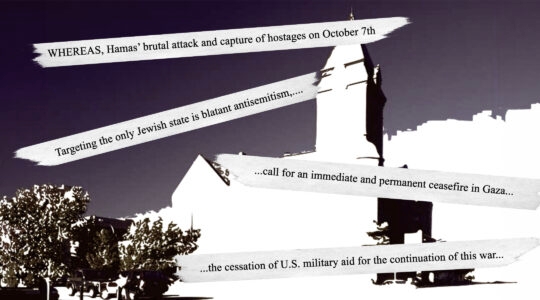In a few weeks, the world will mark the 50th anniversary of the Six-Day War. While some will celebrate a half-century of a united Jerusalem, much of the world will use it as an excuse to rehash the wrongs of the “occupation.” The same will be true of many American Jews who see Israel as both an embarrassment and an unwelcome burden.
Pondering the impact of the events of June 1967 is entirely appropriate. Nor should disagreements about the wisdom of Israel’s continued presence in the West Bank or settlement policies be discouraged. Just as Israelis freely debate these issues, there’s no reason why Americans should fear a debate. But the reluctance of all too many Jews to come to grips with the broad disconnect between their dismay and a broad consensus of Israeli public opinion that understands the Palestinians are still the only meaningful obstacle to peace needs to be noted.
Many liberal Jews agree with former President Obama that Prime Minister Netanyahu bears the blame for the continuance of the conflict. They are increasingly giving a hearing to anti-Zionist groups like Jewish Voice for Peace and the BDS (boycott, divest, sanction) movement that advocates economic war on Israel. Younger Jews and students with only tenuous connections to a sense of Jewish peoplehood are especially vulnerable to such arguments. Even some of those who count themselves as friends of Israel are at pains to disassociate themselves from Netanyahu. For them the fact of the occupation is a disgrace that taints Israel’s good name and compromises its future.
On the left where the idea of intersectionality — the linking of all causes of minority groups — is prevalent, a lot of Jews want no part of an Israel that is depicted as an oppressor or even “apartheid” state. While these charges are rooted in lies and ignorance, some Jews think it preferable to follow the demands of Linda Sarsour, a Palestinian-American leader of the anti-Trump “resistance,” and distance themselves from Zionism rather than to stand with an increasingly unpopular Israel.
But there’s one fact about the conflict that American Jews need to acknowledge: It’s that the overwhelming majority of Israeli Jews — including those who would gladly trade land for peace if it were possible — disagree with them.
The cliché about Israeli politics for most of the last half-century was that the country was split down the middle over the peace process. That was once true but no longer. After the outbreak of the second intifada in 2000 following Ehud Barak’s rejected offer of an independent Palestinian state at Camp David, support for territorial withdrawal collapsed. The aftermath of Ariel Sharon’s retreat from Gaza solidified that trend. The parties of the left that championed the Oslo Accords have either abandoned that position or have been marginalized.
The two leading figures of the opposition to Netanyahu — the former Labor Party now called Zionist Union’s Isaac Herzog and the centrist Yesh Atid’s Yair Lapid—have each put forward manifestos about peace. But Americans who assume they present an alternative to the Likud Party on peace would be disappointed if they bothered to learn what they said. Both advocated positions that largely mimic that of the prime minister. Herzog thinks peace with the Palestinians might be possible in 10 years. Lapid thinks it will take at least 20 years.
This illustrates a broad consensus of Israeli public opinion stretching from the moderate left to the right in which it is understood that the Palestinians are still not interested in recognizing the legitimacy of a Jewish state no matter where its borders might be drawn. Unlike American liberals, Israelis have paid attention to Palestinian rejectionism and terrorism during the last 25 years of peace processing. They understand that while the status quo is unpleasant and disliked by both sides, the alternative in which the Gaza experiment would be replicated in the larger West Bank is not so much unwise as it is crazy.
Liberals may be disappointed that most Israelis prefer to protect their security rather than adopt policies that make them feel good. But while American Jews have every right to beat their breasts about 50 years of occupation, they should spend a moment pondering why Israelis who share their point of view are such a small minority. If they’re honest, they might realize their public anguish is more about virtue signaling than what makes sense for the Jewish state.
Jonathan S. Tobin is opinion editor of JNS.org and a contributing writer to National Review. Follow him on Twitter @jonathans_tobin.




